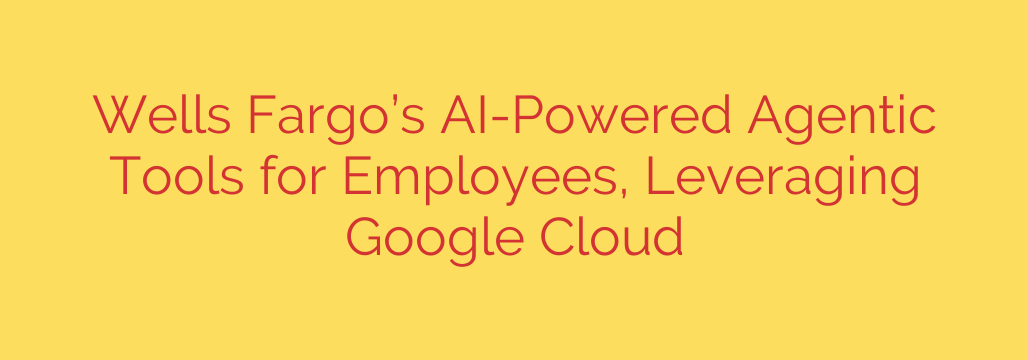
Inside the AI Revolution: How Advanced Assistants Are Reshaping Banking
The world of finance is undergoing a profound transformation, driven by the power of artificial intelligence. While many companies are still exploring basic AI applications, leading financial institutions are already deploying sophisticated tools designed to augment their human workforce. One of the most significant moves in this space involves the development of advanced AI “agents” for employees, signaling a new era of productivity and efficiency in banking.
These are not your average chatbots. The new wave of technology leverages agentic AI, a powerful form of artificial intelligence capable of performing complex, multi-step tasks. Think of it as the difference between a simple calculator and a dedicated research assistant. While a basic AI can answer a direct question, an agentic AI can understand a broader goal, break it down into smaller steps, gather information from multiple sources, and synthesize a comprehensive answer or complete a workflow.
Empowering Financial Professionals with Smarter Tools
For bankers and financial advisors, access to timely and accurate information is critical. However, navigating vast databases of market research, client histories, and complex internal policies can be incredibly time-consuming. This is where AI-powered assistants are making a major impact.
By leveraging powerful large language models, like those developed by Google, these internal tools are designed to act as expert co-pilots for employees. Here’s how they are being used:
- Accelerating Research: A financial advisor can ask the AI to summarize a company’s recent earnings reports, identify key market trends affecting a client’s portfolio, and pull relevant news articles—a task that once took hours can now be done in minutes.
- Streamlining Operations: Bank employees can get instant, clear answers about complex internal procedures or compliance requirements, reducing errors and saving valuable time.
- Gaining Deeper Insights: The AI can analyze large datasets to uncover patterns and insights that might be missed by a human analyst, leading to more informed recommendations and strategic decision-making.
The goal is not to replace human expertise but to amplify it. By automating tedious, information-gathering tasks, these tools free up financial professionals to focus on what they do best: building client relationships and providing high-value strategic advice.
The Critical Role of Security and Responsible AI
Deploying AI within a highly regulated industry like banking requires an unwavering commitment to security and responsibility. For any financial institution, protecting client data is non-negotiable.
To address this, these AI systems are being built within secure, private cloud environments. This ensures that all proprietary and sensitive information remains firewalled from public models and external access. The AI operates exclusively on the institution’s internal data, maintaining strict confidentiality and privacy.
Furthermore, a “human-in-the-loop” approach remains essential. The AI serves as a powerful assistant, but the final judgment, verification, and decision-making authority rest firmly with the human employee. This combination of AI-driven efficiency and human oversight creates a robust framework for responsible innovation in financial services.
What This Means for the Future of Banking
The move toward deploying agentic AI for employees is more than just a technological upgrade; it’s a strategic shift in how financial services will be delivered. As these tools become more widespread, we can expect to see several key benefits:
- Enhanced Customer Experience: When advisors and bankers have better tools and faster access to information, they can provide quicker, more accurate, and more personalized service to their clients.
- Increased Operational Efficiency: Automating routine tasks reduces operational friction and allows institutions to allocate human resources more effectively.
- A New Standard for Productivity: The integration of AI assistants will likely become the new baseline for performance and efficiency across the financial industry.
This evolution is a clear indicator that the future of banking lies in the powerful synergy between human talent and artificial intelligence. By equipping employees with the best technology, financial institutions are not only boosting their own productivity but are also paving the way for a smarter, faster, and more responsive era of customer service.
Source: https://cloud.google.com/blog/topics/financial-services/wells-fargo-agentic-ai-agentspace-empowering-workers/







